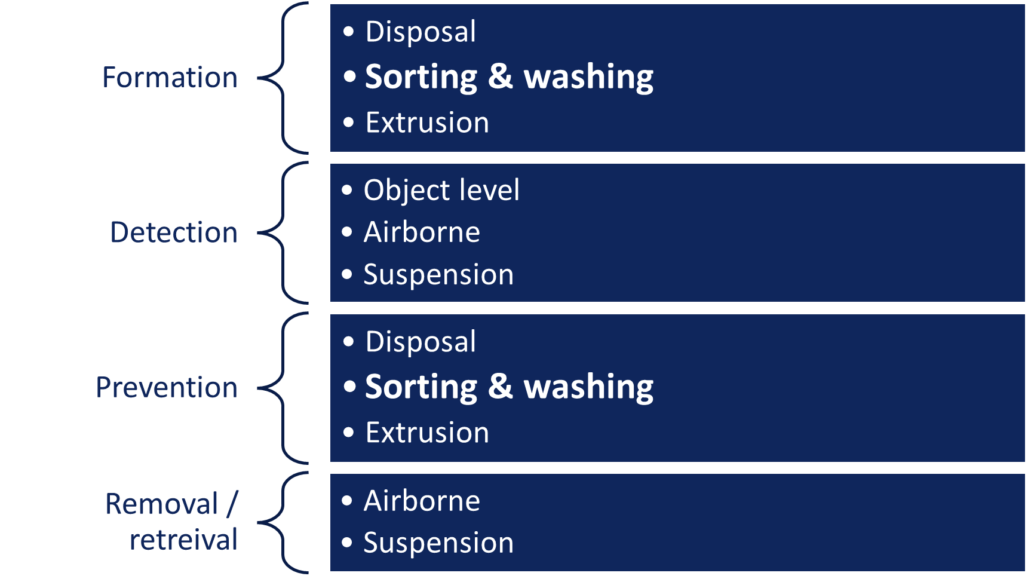The plastic recycling process today has losses and emissions, such as microplastics, inks and incorrectly sorted plastics. This prevents us of closing the plastic cycle. This project aims to enable to increase the yield of recycling, while preventing impact of the environment. This is done through measurement and identification of losses and emissions in different parts in the plastic recycling process, and by defining mitigation strategies to prevent these losses and emissions.
In short:
- Plastic recycling deals with losses and emissions, making it hard to close the plastic cycle
- This project focuses on quantification and mitigation of losses and emissions in plastic waste treatment
- We aim to enable an increase in the yield of recycling, while preventing impact of the environment
How sorting plastics can impact the environment
Before we can recycle plastics, a complex sorting process takes place. First we collect the plastics, then we sort them, grind it into flakes, wash it, and finish with the sorting of flakes. These flakes can then be used for plastic recycling, for instance by mechanical recycling or with upcoming (thermo-)chemical recycling technologies.
Only in the area of object sorting some effort has been put into the reduction of product losses and emissions that occur in the different processes, although not all details are known. Currently there is a lack of quantitative data on these emissions and losses. Examples of emissions and losses are:

Overcoming product losses and increasing yield
The product losses, obviously, lead to a decreased yield but do also impact the environment. Some of the emissions (e.g. small particles) are a concern in water treatment, air quality and emission to the soil. We will focus on quantification and mitigation of losses and emissions in plastic waste treatment for recycling with a focus on municipal solid waste. The type of losses and emissions will be specified and quantified.
Therefore, the project aims to:
- Being able to detect and quantify as well as qualify the different losses and emissions in different parts of the cycle
- Identify possible causes of plastic loss and unwanted emissions in the waste treatment process of municipal solid waste
- Define a mitigation strategy for different causes along complete R-ladder of circularity
- Enable recyclers to recycle plastics more efficiently by increasing the yield, without impacting the environment
Our key activities
The activities of the project will focus on plastics from municipal solid waste. To give the experimental work enough focus, we will specifically target processes after object sorting, and before the recycling process. Desk studies will include the broader plastic recycling process. We also will explore experimental mitigation actions to either prevent product loss and emissions or retrieve product losses in the process for one or more plastics.
For product loss, we distinguish between flake / object loss and formation of smaller items (e.g. during grinding). We address formation, detection, prevention and removal as shown in the visual below.

Expected results
By the end of the project, we will deliver:
- Cause description and ranking of emissions and plastic losses taking into account:
- Types of materials and products;
- The processes (including used chemicals);
- And the quantification of emissions and product loss;
- Mitigation strategies from high to low ranked causes.
These results will be a relevant addition to the plastic value chain to address and partly solve the issue of product losses and emissions to come to a 100% circular system.
Also interesting to read
- Enabling recyclers of plastics to increase the yield
- Ronald Korstanje to discuss the current status of the National Growth Fund program Circular Plastics NL
- 124 million for the first phase of Circular Plastics NL
Or join our LinkedIn-community on Circular Plastics.
This project is co-funded with subsidy from the Topsector Energy by the Ministry of Economic Affairs and Climate Policy.
You might also be interested in
Acknowledgement & partners




















